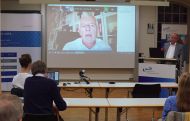
|
|

|
|
|
|

|
|
Montag, 17. August, und Dienstag, 18. August 2020, Halle (Saale)
6th IWH-FIN-FIRE Workshop on “Challenges to Financial Stability”
Die international besetzte, hybrid organisierte Tagung behandelte eine Themenvielfalt vom Zusammenspiel von Währungs- und Fiskalunionen über die Rolle von Technologie im Banking bis hin zu Corporate Finance. Keynote Speaker war
Daniel Paravisini,
London School of Economics (LSE).
Tagungsbericht
|
|

|
|
Dienstag, 22. September 2020, online
Online-Event anstelle der CompNet Annual Conference 2020
Welche Auswirkungen hat Covid-19 auf Firmen und ihre Produktivität? Der Keynote von
Marc Melitz (Harvard University) zum CompNet Firm Productivity Report folgte ein Policy Panel unter dem Titel „How Covid-19 is reshaping international trade and capital flows“ mit Philip Lane (EZB), Gian Maria Milesi-Ferretti (IWF), Caroline Freund (Weltbank) und Beata Javorcik (EBRD).
|
|

|
|
Donnerstag, 8. und Freitag, 9. Oktober 2020, Halle (Saale)
17. IWH/IAB-Workshop zur Arbeitsmarktpolitik: Dynamik am Arbeitsmarkt
Die Corona-Krise hat den deutschen Arbeitsmarkt erheblich erschüttert. Vor dem Hintergrund der Pandemie diskutierte die hybrid durchgeführte Tagung die Entwicklung, Determinanten und Folgen betrieblicher Dynamiken sowie deren gesamtwirtschaftliche und individuelle Auswirkungen. Keynote Speaker:
Ufuk Akcigit
(University of Chicago)
Keynote auf Youtube ansehen
|
|

|
|
Donnerstag, 15. Oktober 2020, Leopoldina, Halle (Saale)
Europa-Debatte: Populistische Strömungen – Wo kommen sie her und wie kann ihnen begegnet werden?
Angesichts der Corona-Pandemie und der damit verbundenen Wirtschaftskrise plädieren populistische Parteien für eine Rückbesinnung auf das Nationale. Die Linguistin
Ruth Wodak
(Lancaster University) und der Politikwissenschaftler
Werner J. Patzelt
(Technische Universität Dresden) diskutierten, woher diese Europa-Skepsis kommt und wie man ihr begegnen kann.
Debatte auf Youtube ansehen
|
|

|
|
Freitag, 16. Oktober, und Samstag, 17. Oktober 2020, online
21st IWH-CIREQ-GW Macroeconometric Workshop: Forecasting and Uncertainty
The workshop provides a platform to discuss new developments in the field of empirical and applied macroeconomic modelling and aims at bringing together academic researchers and practitioners. Keynote Speakers:
Ana Beatriz Galvão (University of Warwick),
Lutz Kilian (Federal Reserve Bank of Dallas),
Michael W. McCracken (Federal Reserve Bank of St. Louis).
|
|

|
|
Mittwoch, 28. Oktober 2020, Halle (Saale)
IWH Policy Talk „Wirtschaft am Ende des Industriezeitalters: Wieso alte Ideologien nicht weiterhelfen und neue Konzepte nötig sind“
Als virtueller Gast diskutierte
Thomas Straubhaar (Universität Hamburg) sein Konzept des bedingungslosen Grundeinkommens mit IWH-Präsident Reint E. Gropp und dem lebhaft interessierten Publikum im Saal sowie im World Wide Web.
|
|
|
|
Alle IWH-Veranstaltungen
|

|
|
|

|
|
|
Journal of Financial Economics
Democracy and Credit
M. D. Delis, Iftekhar Hasan, S. Ongena
>>Does democratization reduce the cost of credit? Using global syndicated loan data from 1984 to 2014, we find that democratization has a sizable negative effect on loan spreads: a 1-point increase in the zero-to-ten Polity IV index of democracy shaves at least 19 basis points off spreads, but likely more. Reversals to autocracy hike spreads more strongly. …<<
|
|

|
|
|
Journal of Financial and Quantitative Analysis
Financial Incentives and Loan Officer Behavior: Multitasking and Allocation of Effort under an Incomplete Contract
P. Behr, A. Drexler, Reint E. Gropp, Andre Guettler
>>We investigate the implications of providing loan officers with a nonlinear compensation structure that rewards loan volume and penalizes poor performance. Using a unique data set provided by a large international commercial bank, we examine the main activities that loan officers perform: loan prospecting, screening, and monitoring. …<<
|
|

|
|
|
Journal of Financial Intermediation
Borrowers Under Water! Rare Disasters, Regional Banks, and Recovery Lending
Michael Koetter, Felix Noth, Oliver Rehbein
>>We show that local banks provide corporate recovery lending to firms affected by adverse regional macro shocks. Banks that reside in counties unaffected by the natural disaster that we specify as macro shock increase lending to firms inside affected counties by 3%. …<<
|
|

|
|
|
Journal of Money, Credit and Banking
Lock-In Effects in Relationship Lending: Evidence from DIP Loans
Iftekhar Hasan, G. G. Ramírez, G. Zhang
>>Do prior lending relationships result in pass-through savings (lower interest rates) for borrowers, or do they lock in higher costs for borrowers? Theoretical models suggest that when borrowers experience greater information asymmetry, higher switching costs, and limited access to capital markets, they become locked into higher costs from their existing lenders. …<<
|
|

|
|
|
Financial Markets, Institutions & Instruments
Motivating High-impact Innovation: Evidence from Managerial Compensation Contracts
B. B. Francis, Iftekhar Hasan, Z. Sharma, M. Waisman
>>We investigate the relationship between Chief Executive Officer (CEO) compensation and firm innovation and find that long-term incentives in the form of options, especially unvested options, and protection from managerial termination in the form of golden parachutes are positively related to corporate innovation, and particularly to high-impact, exploratory (new knowledge creation) invention. …<<
|
|

|
|
|
International Journal of Industrial Organization
Labor Market Power and the Distorting Effects of International Trade
Matthias Mertens
>>This article examines how final product trade with China shapes and interacts with labor market imperfections that create market power in labor markets and prevent an efficient market outcome. I develop a framework for measuring such labor market power distortions in monetary terms and document large degrees of these distortions in Germany's manufacturing sector. …<<
|
|

|
|
|
Journal of Business Finance & Accounting
Profit Shifting and Tax-rate Uncertainty
M. D. Delis, Iftekhar Hasan, P. I. Karavitis
>>Using firm-level data for 1,084 parent firms in 24 countries and for 9,497 subsidiaries in 54 countries, we show that tax-motivated profit shifting is larger among subsidiaries in countries that have stable corporate tax rates over time. Our findings further suggest that firms move away from transfer pricing and toward intragroup debt shifting that has lower adjustment costs. …<<
|
|

|
|
|
Journal of Empirical Finance
National Culture and Housing Credit
C. Gaganis, Iftekhar Hasan, F. Pasiouras
>>Using a sample of around 30 countries over the period 2001-2015, this study provides evidence that deeply rooted cultural differences are significantly associated with the use of mortgage debt. More detailed, we find that power distance and uncertainty avoidance have a negative impact on the value of the total outstanding residential loans to GDP. …<<
|
|

|
|
|
Journal of Financial Stability
Does Machine Learning Help us Predict Banking Crises?
J. Beutel, S. List, Gregor von Schweinitz
>>This paper compares the out-of-sample predictive performance of different early warning models for systemic banking crises using a sample of advanced economies covering the past 45 years. We compare a benchmark logit approach to several machine learning approaches recently proposed in the literature. …<<
|
|

|
|
|
Quantitative Economics
College Choice, Selection, and Allocation Mechanisms: A Structural Empirical Analysis
J. R. Carvalho, T. Magnac, Qizhou Xiong
>>We use rich microeconomic data on performance and choices of students at college entry to analyze interactions between the selection mechanism, eliciting college preferences through exams, and the allocation mechanism. …<<
|
|

|
|
|
Quantitative Economics
HIP, RIP, and the Robustness of Empirical Earnings Processes
Florian Hoffmann
>>The dispersion of individual returns to experience, often referred to as heterogeneity of income profiles (HIP), is a key parameter in empirical human capital models. It is commonly estimated from age variation in the covariance structure of earnings. In this study, I show that this approach is invalid and tends to deliver estimates of HIP that are biased upward. …<<
|
|

|
|
|
Regional Studies
The Impact of Innovation and Innovation Subsidies on Economic Development in German Regions
U. Cantner, Eva Dettmann, Alexander Giebler, M. Kristalova, J. Günther
>>Public innovation subsidies in a regional environment are expected to unfold a positive economic impact over time. The focus of this paper is on an assessment of the long-run impact of innovation and innovation subsidies in German regions. …<<
|
|

|
|
|
Alle IWH-Veröffentlichungen
|

|
|
|
 |
|
|
IWH-Diskussionspapiere Nr. 13/2020
Labour Market Power and Between-Firm Wage (In)Equality
Matthias Mertens
|
|
|
IWH-Diskussionspapiere Nr. 14/2020
The East-West German Gap in Revenue Productivity: Just a Tale of Output Prices?
Matthias Mertens, Steffen Müller
|
|
|
IWH-Diskussionspapiere Nr. 15/2020
Trade Shocks, Credit Reallocation and the Role of Specialisation: Evidence from Syndicated Lending
Isabella Müller
|
|
|
IWH-Diskussionspapiere Nr. 16/2020
Cultural Resilience and Economic Recovery: Evidence from Hurricane Katrina
Iftekhar Hasan, S. Manfredonia, Felix Noth
|
|
|
IWH-Diskussionspapiere Nr. 17/2020
Exchange Rates and the Information Channel of Monetary Policy
Oliver Holtemöller, A. Kriwoluzky, Boreum Kwak
|
|
|
IWH-Diskussionspapiere Nr. 18/2020
Banking Deregulation and Household Consumption of Durables
H. Evren Damar, I. Lange, C. McKennie, M. Moro
|
|
|
IWH-Diskussionspapiere Nr. 19/2020
Robot Adoption at German Plants
Liuchun Deng, Verena Plümpe, Jens Stegmaier
|
|
|
IWH-Diskussionspapiere Nr. 20/2020
Marginal Returns to Talent for Material Risk Takers in Banking
Moritz Stieglitz, Konstantin Wagner
|
|
|
IWH-Diskussionspapiere Nr. 21/2020
Competition, Cost Structure, and Labour Leverage: Evidence from the U.S. Airline Industry
Konstantin Wagner
|
|
|
Alle IWH-Diskussionspapiere
|

|
|
|

|
|
|
IWH-Pressemitteilung 15/2020
IWH-Insolvenztrend: Entwicklung setzt sich fort – immer mehr Beschäftigte von Insolvenzen betroffen
>>Im Juli waren in Deutschland mehr als dreimal so viele Jobs von Unternehmensinsolvenzen betroffen wie im Durchschnitt der ersten Monate dieses Jahres. Auch gegenüber dem Vormonat ist ein deutlicher Anstieg zu verzeichnen. Die Anzahl der Firmenpleiten ist dagegen erneut leicht gesunken. …<<
|
|
|
IWH-Pressemitteilung 16/2020
IWH-Gutachten: Regionalförderung wirkt, sollte aber weiter verbessert werden
>>Deutschlands wichtigstes Instrument der Regionalpolitik fördert Arbeitsplätze, erhöht Betriebsumsätze und moderat auch die Löhne; es hat jedoch keine positiven Effekte auf die Produktivität. Das zeigt ein IWH-Gutachten zur Wirkung der Bund-Länder-Gemeinschaftsaufgabe „Verbesserung der regionalen Wirtschaftsstruktur“ (GRW). …<<
|
|
|
IWH-Pressemitteilung 17/2020
IWH-Insolvenztrend: Zahl der Insolvenzen auf Tiefststand, Insolvenztrend künftig mit Vorschau
>>Die Zahl der Insolvenzen erreichte im August einen Tiefststand. Nach deutlichem Anstieg in den Vormonaten ist zudem die Anzahl der von Unternehmensinsolvenzen betroffenen Jobs im August erstmals wieder spürbar gesunken. …<<
|
|
|
IWH-Pressemitteilung 18/2020
Konjunktur aktuell: Wirtschaft erholt sich vom Corona-Schock – aber keine schnelle Rückkehr zur alten Normalität
>>Die deutsche Wirtschaft hat im Sommer einen erheblichen Teil des Produktionseinbruchs vom Frühjahr wieder wettgemacht. Dennoch dürfte das Bruttoinlandsprodukt (BIP) im Jahr 2020 um 5,7% niedriger liegen als 2019. Für das Jahr 2021 ist laut der Herbstprognose des IWH mit einem BIP-Zuwachs von 3,2% zu rechnen. …<<
|
|
|
IWH-Pressemitteilung 19/2020
IWH-Insolvenztrend: Zahl der Insolvenzen stabilisiert sich auf niedrigem Niveau, Anzahl der betroffenen Jobs hoch
>>Die Zahl der Insolvenzen war im September sehr niedrig, und auch für die kommenden Monate ist nicht mit einem spürbaren Anstieg zu rechnen. Dennoch liegt die Anzahl der Jobs, die von Unternehmensinsolvenzen betroffen sind, im September deutlich über dem Niveau zu Jahresbeginn. …<<
|
|
|
IWH-Pressemitteilung 21/2020
Gemeinschaftsdiagnose Herbst 2020: Erholung verliert an Fahrt – Wirtschaft und Politik weiter im Zeichen der Pandemie
>>Die Corona-Krise hinterlässt deutliche Spuren in der deutschen Wirtschaft und trifft diese härter als noch im Frühjahr angenommen. In ihrem Herbstgutachten revidieren die führenden Wirtschaftsforschungsinstitute ihre Prognose für dieses und nächstes Jahr um jeweils gut einen Prozentpunkt nach unten. Sie erwarten nun für 2020 einen Rückgang des Bruttoinlandsproduktes um 5,4% (bislang -4,2%) und für 2021 einen Zuwachs um 4,7% (5,8%). 2022 dürfte die Wirtschaftsleistung dann um 2,7% zulegen. …<<
|
|
|
IWH-Pressemitteilung 22/2020
Konjunktureinbruch in Ostdeutschland nicht so stark wie in Deutschland insgesamt – Implikationen der Gemeinschaftsdiagnose Herbst 2020 und amtlicher Länderdaten für Ostdeutschland
>>Die deutsche Wirtschaft hat sich nach dem pandemiebedingten drastischen Einbruch im Frühjahr 2020 zunächst rasch wiederbelebt. Im zweiten Halbjahr verliert die Erholung aber stark an Fahrt. Die Projektgruppe Gemeinschaftsdiagnose geht davon aus, dass das Produktionsniveau von vor der Krise erst wieder in der zweiten Hälfte des Jahres 2021 erreicht werden wird. Die ostdeutsche Konjunktur folgt im Prinzip diesem Muster; allerdings dürfte der Konjunktureinbruch hier etwas milder ausfallen. …<<
|
|
|
IWH-Pressemitteilung 23/2020
IWH-Insolvenztrend: Insolvenzzahlen steigen leicht, aber keine Insolvenzwelle trotz Rückkehr zur Antragspflicht
>>Die Zahl der Insolvenzen war im Oktober erneut sehr niedrig, lag jedoch leicht über den Zahlen von August und September. Für die kommenden beiden Monate rechnet das IWH mit weiter steigenden Zahlen, ohne dass es jedoch zu einer Insolvenzwelle kommt. …<<
|
|
|
Alle IWH-Pressemitteilungen
|

|
|
|
 |
|
|
Impressum
Leibniz-Institut für Wirtschaftsforschung Halle
(IWH)
Kleine Märkerstraße 8
D-06108 Halle (Saale)
Tel +49 345 7753 60
www.iwh-halle.de
| Vorstand: |
Vertretungsberechtigter
Vorstand: Professor Reint E. Gropp, Ph.D.,
Professor Dr. Oliver Holtemöller,
Professor Michael Koetter, Ph.D.,
Dr. Tankred Schuhmann, Anschrift wie oben |
| Registergericht: |
Vereinsregister Stendal,
Vereinsregisternummer 21103 |
|
|
|
|